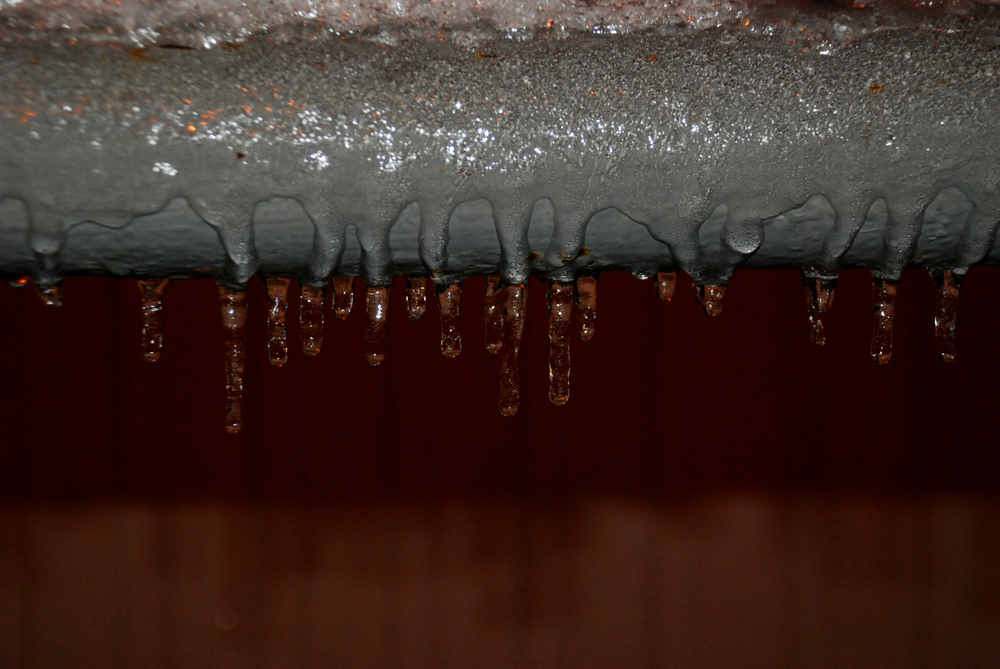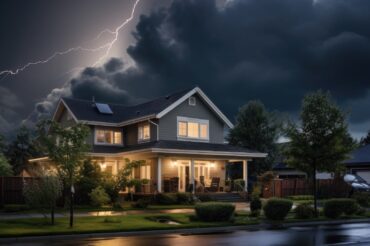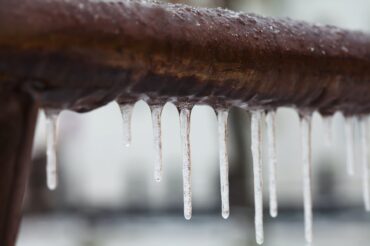
As the temperatures drop around Kansas City, it becomes increasingly important to take proactive measures to safeguard your home’s plumbing system from the potentially devastating effects of frozen pipes. The frigid winter temperatures can wreak havoc on your plumbing, leading to a cascade of issues that can be both inconvenient and expensive to resolve.
In this blog, we’ll talk about the problems caused by frozen pipes and share what to do so your pipes don’t freeze. We’ll also provide key advice on what steps you should take if your pipes do freeze, despite your best efforts. (Hint: it involves calling your friends at Top Notch Heating, Cooling, and Plumbing for help!)
The Dangers of Frozen Water Pipes
Frozen pipes can spell trouble for your home, causing significant damage and major headaches. When water freezes inside your pipes, it expands and puts immense pressure on the pipe walls. This can lead to some serious issues, including cracks, bursts, and even complete pipe failures. Here’s a closer look at what can happen:
- Water Woes: If a pipe freezes and bursts, it can unleash a flood of water into your home, wrecking walls, ceilings, floors, and your belongings.
- Costly Fixes: Dealing with burst pipes can be expensive. You might have to shell out for repairs or replacements, and that can mean even more money spent on fixing up your home.
- Disruptions: Dealing with burst pipes can really mess up your daily routine. Sometimes, you might even have to turn off your water temporarily until the repairs are done, which can be a big hassle.
- Mold and Mildew Mayhem: When pipes burst and water damage sets in, it creates the perfect environment for mold and mildew to thrive. These unwanted guests can not only harm your home’s structure but also pose health risks for you and your family.
The dangers of frozen pipes are no joke, and they can lead to a chain reaction of problems that go beyond just plumbing troubles. Taking proactive steps to prevent frozen pipes is key to protecting your home from these potential headaches.
What to Do So Your Pipes Don’t Freeze
If you want to know what to do so your pipes don’t freeze, you’ve come to the right place! Here are some tips to prepare your plumbing system for cold weather and prevent pipes from freezing:
Add Pipe Insulation
Start by insulating exposed pipes, especially those located in unheated areas like basements, crawl spaces, and attics. Proper pipe insulation acts as a cozy blanket, helping to maintain a higher temperature around the pipes in freezing temperatures.
Seal Cracks and Gaps
Carefully inspect your home’s walls and foundation for any cracks or gaps. Seal them up to keep cold drafts out, which can otherwise lead to issues. This simple step can go a long way in stopping your pipes from freezing.
Let Your Faucets Drip
On those bone-chilling nights when temperatures plummet, consider allowing your faucets to drip ever so slightly (only a trickle!). This clever trick helps relieve pressure within the pipes and keeps water flowing, reducing the likelihood of a frozen pipe.
Keep All Interior Doors Open
Keep interior doors wide open to ensure warm air circulates throughout your home, reaching all areas with plumbing. This even distribution of heat helps maintain a balanced temperature, preventing localized cold spots.
Maintain Adequate Heat
Maintaining a steady indoor temperature is crucial during winter, even when you’re not at home. Investing in a programmable thermostat can make this task much easier and ensure that your home remains adequately heated even in extreme cold.
Disconnect Garden Hoses
Don’t forget about your outdoor plumbing! Disconnect and drain all outdoor hoses, and remember to turn off the water supply to outdoor faucets. This step is essential to prevent freezing in your exterior plumbing components.
Prepare for Winter Vacations
If you’re planning a winter getaway, take precautions before you leave. Turn off the main water supply to your home and thoroughly drain your pipes to avoid any unpleasant surprises in your absence. Whatever you do, don’t turn off your heat!
Now that you know what to do so your pipes don’t freeze, you can significantly reduce the chances of your pipes turning into frozen popsicles.
What Happens If Your Pipes Freeze?
Despite your best efforts, pipes can still freeze during a severe cold snap. If you suspect your pipes have frozen, look for signs such as a lack of water flow from faucets, frost or ice accumulation on exposed pipes, unusual odors or sounds, low water pressure, or visible damage like bulging or cracked pipes. If you notice any of these things, here’s what you should do:
- Turn Off the Water: Immediately shut off all water supply lines. This step is crucial to prevent additional water from entering the frozen pipe, which can exacerbate the situation or lead to burst pipes.
- Thaw Frozen Pipes: Carefully attempt to thaw frozen pipes using a gentle heat source like a hair dryer, space heater, or electric heating pad. Start at the end of the pipe nearest to the faucet and work your way toward the frozen section. Continue applying heat until water flows freely from the faucet. Avoid using an open flame or high-intensity heat source, as they can be dangerous and cause more damage.
- Keep Faucets Open: As you thaw a frozen pipe, keep the affected faucet open to allow any water or pressure to escape. This helps relieve pressure and reduces the risk of bursting.
- Check for Damage: Inspect the pipes for any visible damage, such as cracks, bulges, or leaks, as these may indicate a burst pipe.
- Contact a Plumbing Professional: If you can successfully thaw the frozen pipes and there is no significant damage, your plumbing should return to normal operation.
However, if you discover burst pipes or extensive damage, you’ll need to contact a professional plumber for repairs. They can assess the situation, recommend the necessary repairs or replacements, and ensure your plumbing system functions properly once again.
Act fast if you think your pipes are frozen to reduce damage and prevent more problems. These steps will help you handle the situation quickly and protect your plumbing system.
Trust Top Notch To Take Care of Your Home’s Plumbing System
Don’t let the winter weather catch you off guard! By following the winterization tips mentioned above, you can prevent your pipes from freezing and causing trouble. If you ever find yourself facing a plumbing problem, remember that Top Notch Heating, Cooling, and Plumbing has a solution. You can trust us to keep your pipes in great condition and your home warm throughout the chilly winter months.
Located in Lenexa, Kansas, we are conveniently positioned to serve customers across the entire Kansas City metro area. Contact us today for service and we’ll be there in a flash!







